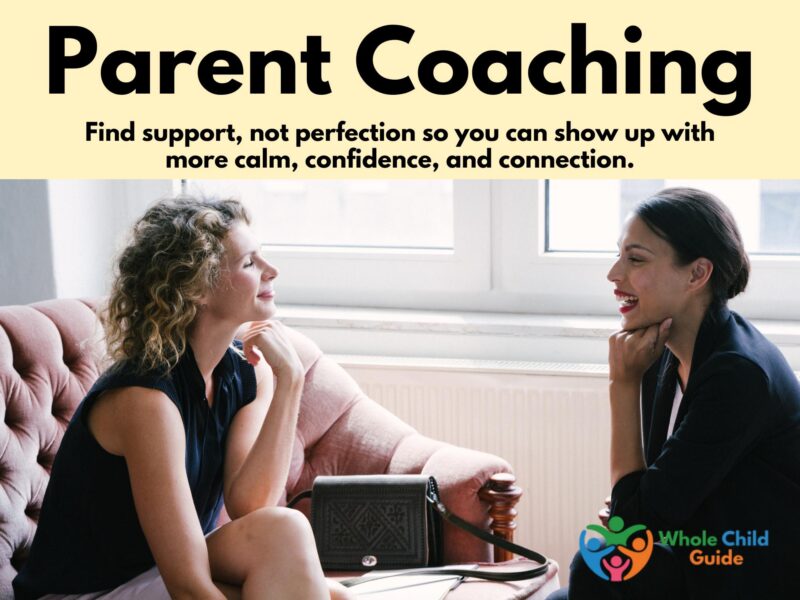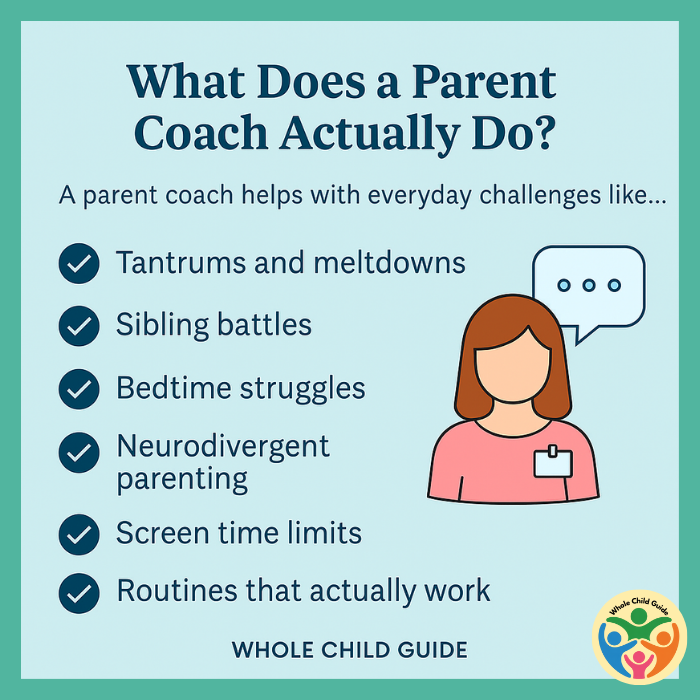
Parenting doesn’t come with a manual, but it is possible for it to come with a parent coach.
If you’ve ever found yourself thinking, “I wish someone could just tell me what to do,” you’re not alone. Parenting is one of the most meaningful, and often overwhelming, jobs we face. That’s where parent coaching comes in. Below, we’ll talk more about what it means to be a parent coach and how parent coaching can support families.
At Whole Child Guide, we believe that supporting a child means supporting their entire ecosystem of development, and that includes the family. We wanted to put together some blog post resources to help parents understand how parent coaching fits into the bigger picture of whole child development.
And when it comes to the professionals behind a parent coaching service: that role is vital in building strong partnerships with families and other professionals to help each child thrive.
Let’s explore how parent coaching can be the bridge between everyday challenges and deeper, lasting connection.
What is a Parent Coach?
A parent coach is a support service who helps families navigate the ups and downs of parenting with confidence, compassion, and clarity. Just like a coach on a sports team, a parent coach manages the needs of a family to help parents grow and develop. They support strengths and identify areas of need. From managing meltdowns to creating routines, from supporting neurodivergent kids to building better communication at home, parent coaching is a powerful tool for growth. The end goal is a functioning family and the service is not just for children, but for caregivers too.
So you might be thinking, how is a parent coach different from a therapist or a pediatrician or other developmental service that supports the family?
Parent Coach Background
The training and credentials of a parent coach can vary widely, but most have specialized experience in child development, family dynamics, or behavior support. Most have some kind of certified parent coaching certificate or a degree in a field like child development, psychology, social work, counseling, or occupational therapy.
Example of how parent coaching works:
Let’s break it down into professionals that a family might use to help with parenting questions that come up. We might hear a common parenting concern like:
“My 6-year-old is having frequent meltdowns after school, refuses to do homework, and says they hate school.”
Different types of service providers might offer different tools and supports.
- A teacher might focus on the classroom performance & learning environment. This looks like:
- Observing that the child struggles with transitions or focus in the classroom
- Providing classroom accommodations (e.g., sensory breaks, visual schedules)
- Communicating concerns with parents and suggest further evaluation or school support team involvement
- Observing that the child struggles with transitions or focus in the classroom
- The pediatrician may focus on medical or developmental concerns. They will likely:
- Check for underlying issues like ADHD, sleep problems, anxiety, or sensory processing differences
- Provide a referral to a specialist (e.g., OT, psychologist)
- Might recommend lab work, hearing/vision screening, or developmental assessments
- Check for underlying issues like ADHD, sleep problems, anxiety, or sensory processing differences
- A therapist may focus on the emotional and behavioral health. They might:
- Work with the child to understand triggers for meltdowns
- Teach coping skills, emotional regulation, and communication
- May explore anxiety, trauma, or social challenges contributing to school resistance
- May involve family therapy to improve home routines and reduce conflict
- Work with the child to understand triggers for meltdowns
- Finally, a parent coach might focus on empowering the parent at home. This looks like:
- Helping the parent understand why the after-school meltdowns are happening (e.g., sensory overload, transition fatigue)
- Working with the parent to create calm routines, expectations, and emotional support strategies
- Coaching on consistent responses, positive discipline, and communication tools
- Offering mindset support for overwhelmed parents, such as: “You’re doing your best, and here’s what you can try next.”
- Helping the parent understand why the after-school meltdowns are happening (e.g., sensory overload, transition fatigue)
The key difference is that a parent coach is your support partner in the day-to-day moments of parenting, helping you understand your child and guide their growth with intention. Another thing to remember is that all four professionals in our example above bring a different piece of the puzzle. When they collaborate, the child is supported at school, home, and within their body and mind in order to create stronger, lasting progress. This is what we strive to do with the Whole Child Guide!

A parent coach can help with a wide variety of concerns that come up in families.
What Can a Parent Coach Help With?
A parent coach helps families feel more confident and connected by offering practical, personalized strategies for everyday parenting challenges. Unlike therapy or medical care, parent coaching focuses on building skills, routines, and mindset shifts that empower caregivers to support their child’s unique needs.
A parent coach walks alongside parents, offering guidance, accountability, and a safe space to grow as a parent. It’s not about being perfect; it’s about parenting with purpose.
Some common challenges that a parent coach can assist with include:
- Tantrums, power struggles, and behavior
- Emotional regulation and connection
- Screen time boundaries
- Sleep routines or transitions (e.g., starting school)
- Sibling rivalry or family dynamics
- Neurodivergent support (ADHD, autism, sensory needs)
- Building routines, consistency, and confidence
- Morning and bedtime routines
- Transitions between activities
- Screen time battles
- Homework resistance
- Power struggles
- Sleep challenges
- Sensory overload at home
- Parenting a neurodivergent child
- Building a toolbox of emotional regulation ideas
- Creating family routines
- Co-parenting conflicts
- Setting limits and boundaries
- Increasing positive communication
- Handling public behavior challenges
- Building consistency and follow-through
- Reducing parental stress and overwhelm
When you work with a parent coach, sessions can look very different from family to family. That’s because of the individual needs of the parent and the children. But no matter what challenges your family is experiencing, a coach can support these needs. Basically if you are feeling stuck or overwhelmed as a parent or family, the coach is there to support you.
How does Parent Coaching Work?
A session with a parent coach is a supportive, judgment-free conversation. It’s focused on helping you feel more confident and equipped as a caregiver. You’ll talk through specific challenges that your family experiences…things like bedtime battles, emotional outbursts, or transitions. Then, the coach helps you to explore what’s happening beneath the surface. Instead of offering generic advice, the coach listens, asks thoughtful questions, and helps you find strategies that actually fit your child’s needs and your family’s values.
Sessions often include practical tips, goal setting, and small steps you can try right away. Parent coaching sessions can be held in-person or in a virtual, online session.
Whether virtual or in-person, it’s a space designed to build skills, reduce stress, and help you show up with more calm and connection each day.
There may be follow up sessions to report back on how strategies worked and collaborative goal setting. Parent coaching always uses individualized and practical strategies, not judgment.
Finding a Parent Coach
Finding the right parent coach means finding someone who understands your family’s unique needs, values, and challenges. All families navigate challenges of racing kids, but sometimes there are aspects to the family that make it very difficult. Meltdowns, parenting a neurodivergent child, managing routines, or just feeling overwhelmed can make things very challenging as a parent.
The right coach will listen without judgment and offer strategies that truly fit your life, and not with a one-size-fits-all approach.
Our suggestions is to look for someone with experience in the areas that matter most to you, and who makes you feel supported and empowered. Ready to find a coach who meets you where you are? Browse trusted parent coaches on Whole Child Guide Services and take the first step toward calmer, more connected parenting.
